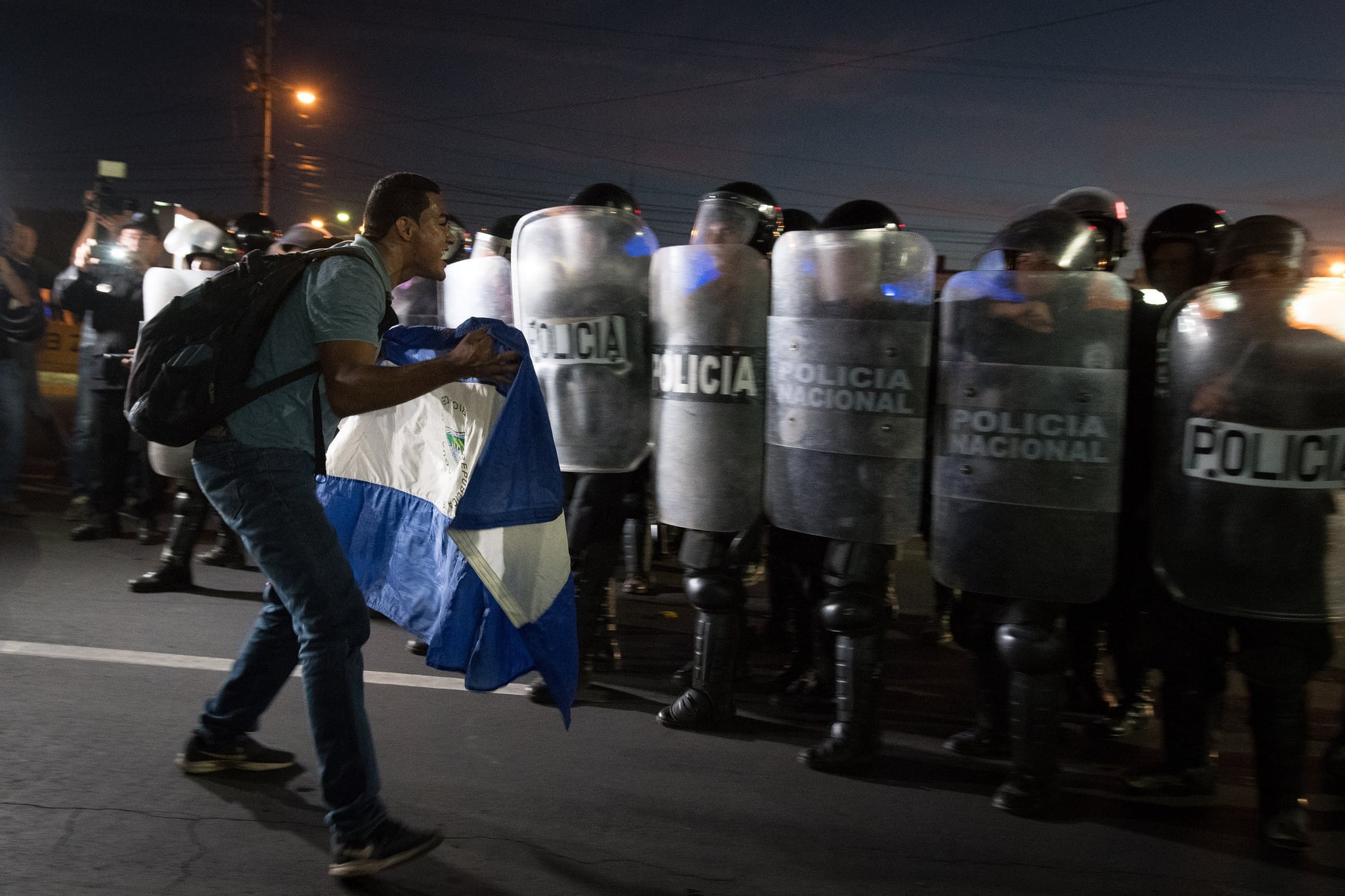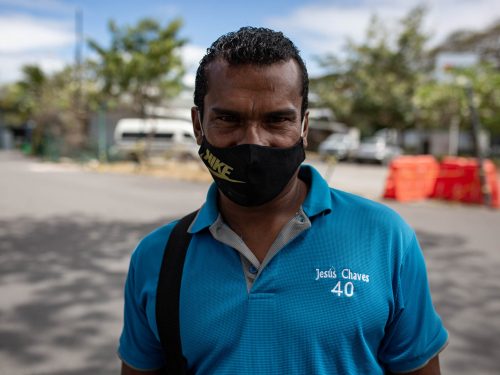
At least 28 people have died in Nicaragua after police forces and government-aligned groups violently repressed protests across the country, as anti-government demonstrations enter their sixth consecutive day. On Sunday, April 22th at night the police attacked and shot the students who were taking refuge at a campus university in Managua. At least 14 were injured.
Today, Monday 23th, Vice President Rosario Murillo announced the Government will now accept an open dialogue about “all topics” referring to the civil demands of the protesters and that, as proof of their will to talk, they have been releasing demonstrators who were captured by the police. A few hours later, a massive peaceful march took place in Managua, with marchers coming from numerous cities in Nicaragua, where people demanded justice for the dead, a stop to the censorship, free elections, among other topics.
Supermarkets, markets and stores looting increased on Sunday morning as well as fires and barricades in major urban centers. Non-governmental organisations reported at least 65 injured, 200 people captured by the police and 60 missing people, while several independent TV channels remain censored and one reported a deliberate attack that took down its website.
The announcement of reforms to the Social Security Pension System by the government of President Daniel Ortega triggered national outrage. During the weekend, Ortega called for a renewed dialogue only with the business sector in the country while discrediting protestors by referring to them as “gangs” and threatening the use of “constitutional measures” against them.
As shops were plundered on Sunday morning, government-aligned media claimed that demonstrators were responsible for the looting, a claim that was largely rebuked by independent media. Images released during the day show policemen closely following events, cooperating with looters, and even carrying goods from stores themselves.
In a joint appearance with foreign investors representing the Free Trade Zone supporting him, President Ortega announced on Sunday afternoon that new pension scheme will be revoked. He reiterated his willingness to negotiate, although only with the private sector, and invited leaders of the Catholic Church to be guarantors of such dialogue.
After threatening with “constitutional measures” against protestors, Ortega did not refer to several independent TV channels pulled from air by the government nor to the repression by police forces. Nonetheless, the private sector refused his proposal, conditioned their acceptance to a national dialogue, called for a “march for peace” and requested Ortega to stop violence against protests and media censorship.
Leaders of the Catholic Church, who have sheltered demonstrators in their temples as violence raged on the streets, also called to end repression and initiate a national dialogue to seek solutions.
Other citizen-led groups have stated that the time for dialogue has ended and are demanding Ortega to step down. Protests continued to take place in different cities in the country on Sunday night after Ortega’s speech.
Protests began on April 18th, sparked at first by changes to the welfare system and later with greater conviction against the violence employed by police and by government-aligned youth groups, known as Juventud Sandinista.
As a response, Ortega’s government ordered several TV channels off-air –one of which was still censored on Sunday– and deployed armed sympathizers who beat defiant citizens in plain sight of policemen. Local and international media have reported the use of tear gas, rubber bullets, and live ammunition by the police. The government has deployed the military in the capital Managua and other major cities.
Among the dead is journalist Ángel Gahona who was killed by a gunshot to the head during a facebook live broadcast. On Saturday night, Gahona was reporting from Bluefields, in the Caribbean coast, and the moment of his death was recorded on his Facebook Live.
At least 14 other reporters have been injured, attacked or robbed by government-aligned groups. Journalist Salomón Manzanares was kidnapped while in duty in the city of León, in the West of the country. He was released on Monday morning.
Damage to property and infrastructure has been estimated in the millions of dollars as fires spread across the country and buildings have been reduced to smoldering wrecks. In Managua, citizens toppled several of the so-called “trees of life”, huge metallic structures erected by the Ortega administrations and symbols of his government. Billboard with the image of the president and his wife, who is also the vice president, were torn apart and burned in several cities.
The announcement of reforms to the Social Security Pension System by the government of Ortega triggered national outrage. Photo: Carlos Herrera/ Confidencial.
Fires were reported in two radio stations (one of them independent and the other government-led), three city halls, a university building and a police car.
Speaking from the Vatican City, Pope Francis, called for an end to violence in Nicaragua.
“I want to make public my closeness in prayer to that beloved country”, the Pope said. “I join bishops calling for an end of every violence, that useless bloodshed is avoided and that open issues are resolved peacefully and with a sense of responsibility.”
The US State Department ordered the departure of U.S. government family members and authorized the departure of U.S. government personnel, according to a statement.
They also called for calm and condemned the violence perpetrated by the police and others against citizens, while the European Union expressed its support for a “broad and inclusive dialogue among all sectors of society”.
The Organization of American States (OAS) and the Office of the United Nations High Commissioner for Human Rights also spoke against the events in Nicaragua calling for peace and respect for freedom of expression.
Meanwhile, Humberto Ortega, Ortega’s brother and former Army Chief, asked Cardinal Leopoldo Brenes to be the guarantor of a dialogue with the government to stop deaths.
Zoilamérica Ortega Murillo, Ortega’s stepdaughter exiled in Costa Rica and who denounced being raped by her stepfather 20 years ago, told Costa Rica’s La Nación newspaper that the president does not admit that the people are protesting out of their own will.
“This mentality of abuse of power, of becoming the owners of Nicaragua, is causing them to behave in a genocidal, bloodthirsty, disproportionate manner”, said the younger Ortega.
Nicaraguans abroad have gathered to support the protests in Miami (USA), Madrid (Spain), San Jose (Costa Rica), Panama City (Panama), London (United Kingdom), and Paris (France) calling for peace in their country.







Comments